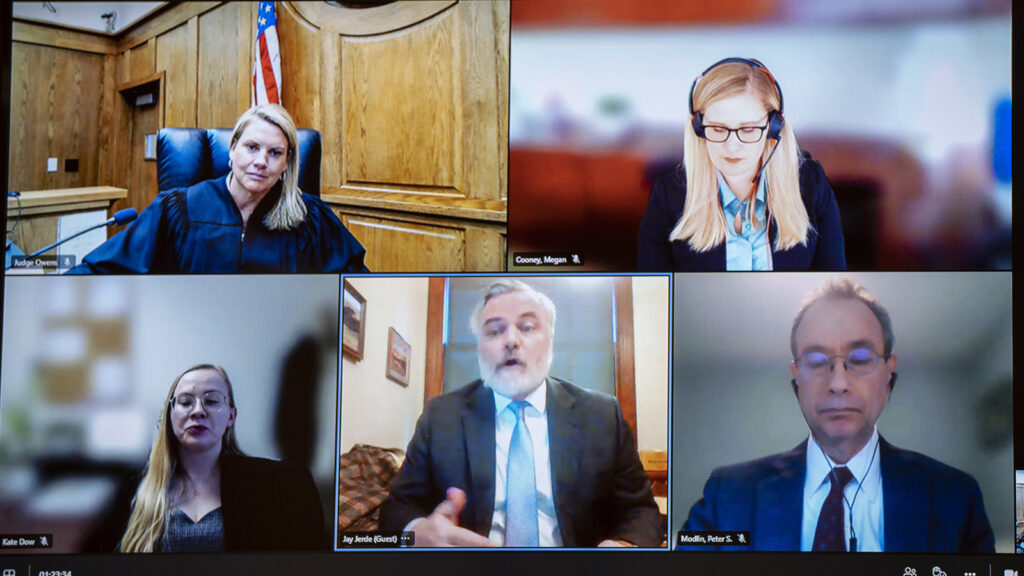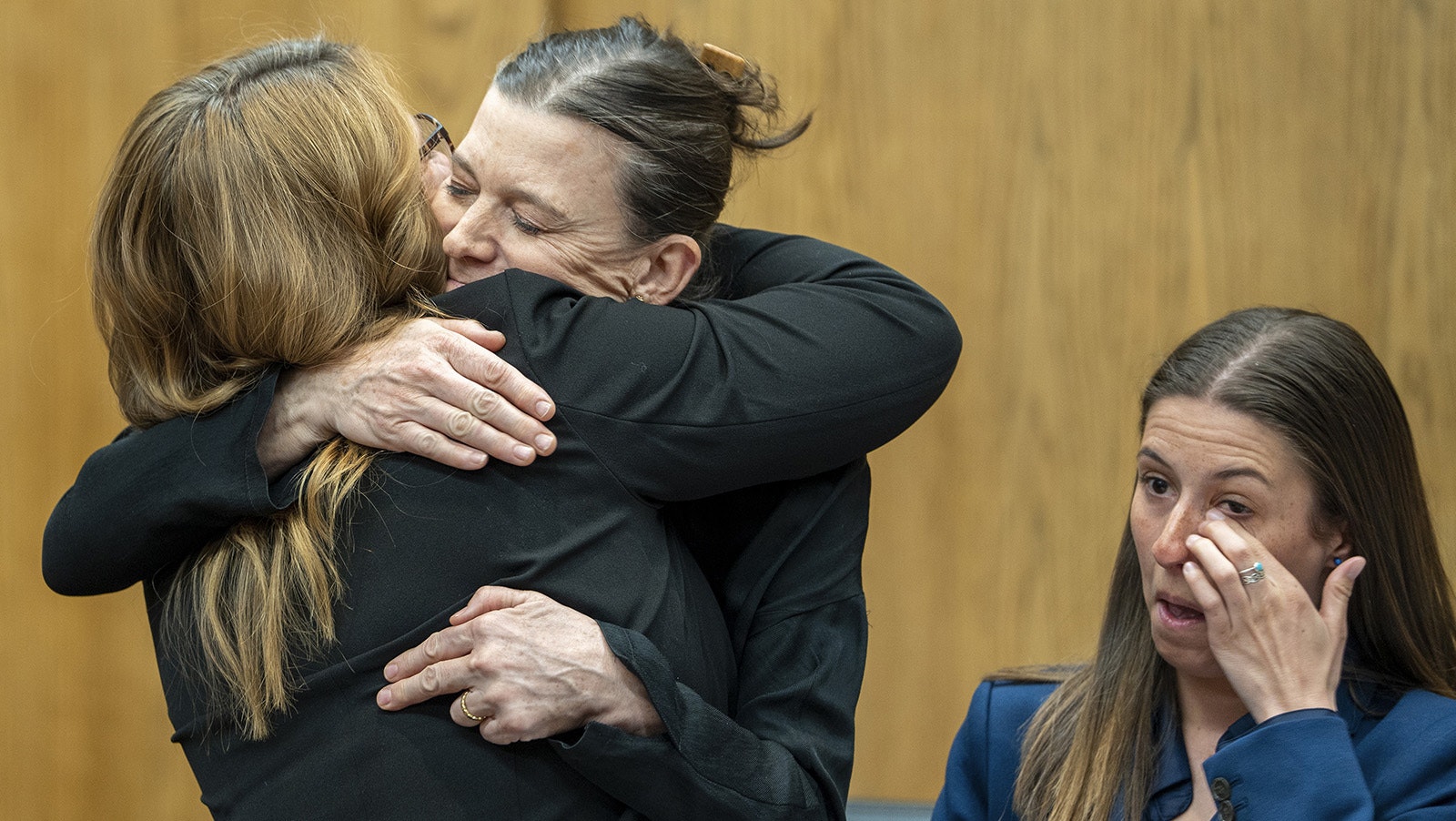Nearly all abortions were illegal in Wyoming from Saturday to Wednesday, but now they’re legal again up to the point of fetal viability.
The Life is a Human Right Act passed into law overnight Saturday. It outlaws nearly all abortions with exemptions for infants conceived in rape and incest, and many carveouts for in-utero fatal anomalies and other health issues.
Teton County District Court Judge Melissa Owens blocked the law from enforcement in an emergency hearing Wednesday afternoon after a pro-choice coalition sued the state, claiming it’s unconstitutional.
Owens referenced a portion of the Wyoming Constitution that promises “health care” autonomy to state residents.
“Wyomingites voted into law that they have a fundamental right to make their own health care decisions,” said Owens when announcing the block on the new law. “The Legislature cannot make an end run, essentially, around providing a (new) Constitutional amendment. The court needs to further inquire if abortion is health care.”
If she finds that abortion is “health care,” said Owens, her next duty will be to determine whether the Legislature can still outlaw abortion under another constitutional provision that lets it craft reasonable and necessary restrictions on health care.
“At this point the state cannot legislate away a constitutional right,” said Owens.
Owens said she’d schedule another hearing on a preliminary injunction, which is a longer pause on the law keeping it from being enforced throughout the case against it.
She encouraged the parties in the case to consider scheduling a trial on the law itself for the same date as a preliminary injunction hearing.

This Is The Sequel
The legal debate around the act is nearly a repeat of last summer, when Wyoming enacted a prequel law known as the “trigger ban” that triggered into effect to ban nearly all abortions after the U.S. Supreme Court overturned Roe vs. Wade.
Owens blocked that law in July and was still contemplating whether it was constitutional when the Legislature released the new act as a more-specific rewrite of the trigger ban.
Gov. Mark Gordon let the “Life Act,” Attorney General deputy Jay Jerde has nicknamed it, become law without the governor’s signature. Gordon said he wishes the Legislature would ask Wyomingites whether they feel abortion is health care by advancing a proposed constitutional amendment on the matter to voters.
Separation Of Powers
Owens said the act also violates the separation of powers doctrine in the Constitution because the Legislature announced in the law that abortion is not health care.
“The Legislature declaring that abortion is not health care takes away from the duty of this court to decide constitutional questions of law,” she said. “And that violates separation of powers.”
That was the main argument that many of the law’s detractors used to oppose or change it while lawmakers were still crafting it this winter.
But That’s Different
While the law’s plotline is similar to the events of 2022, there are unique elements in it.
Wyoming Secretary of State Chuck Gray, along with Republican state Reps. Rachel Rodriguez-Williams of Cody and Chip Neiman of Hulett, and the Wyoming Right to Life group, all asked to join the lawsuit by filing an amicus brief.
The delegates also asked to join last year’s suit as intervenors, but Gray did not offer to join that lawsuit.
Owens said the pro-life group brought its brief under a rule that usually applies to appellate procedures. She also noted that the request came roughly two hours before the emergency hearing.
Owens denied the parties’ motion to join the suit ahead of the emergency hearing Wednesday.

But Not Pregnant Women
There are other major differences between the laws and how they are being handled in court.
While the trigger ban would have criminalized women who receive abortions, the Life Act focuses instead on doctors and exempts mothers from prosecution.
The Life Act has more carveouts for medical conditions, such as cancers and diseases, and affords doctors who use abortion to save a mother’s life the ability to rely on their “reasonable medical judgment” in doing so. Doctors under the law would be required to try to save both mother and baby when they can, however.
Six Abortions Canceled
The plaintiffs – consisting of an abortion clinic, an abortion support nonprofit group, two doctors and two women in their child-bearing years – said that letting the law go into effect would cause irreparable harm to one or more of them.
They also asserted that they are likely to succeed in their case against it.
Owens had to agree with both assertions to legally issue her temporary restraining order blocking the law. And she did.
Dr. Giovannina Anthony, A doctor who performs abortions in Jackson, wrote in her portion of the lawsuit that she could be criminally charged and lose her livelihood if the law becomes operational. Her attorney, John Robinson, echoed that worry in court Wednesday.
“Just since Sunday – and I believe this was on Monday – Dr. Anthony had to cancel the appointments of six patients who were scheduled to receive abortion care that day,” said Robinson, adding that Anthony turned away one prospective patient who called her office seeking an abortion.
During the few days when it was a functioning law, the Life Act made performing an abortion a felony punishable by up to five years in prison and $20,000 in fines.
“It was devastating news to deliver for her staff; devastating news for the patients to receive,” Robinson said.
For A Century Before That
Plaintiffs had four main complaints against the law. They alleged that it’s unconstitutionally vague, that it would force people to adopt a Christian approach to the issue, that it is sexist against women and that abortion is “health care.”
Jerde said the plaintiffs have no proof the law is an impermissible religious coercion because Wyoming had outlawed abortion from the point of conception onward for about 100 years before the 1973 Roe vs. Wade decision created a federal abortion right that the state had to change its laws to honor.
He said that the law does line up with the beliefs of “some religions,” but that doesn’t make it an automatic violation of the establishment clause, which forbids the state from making a state religion through its laws.
Men Not Missing Abortions
Jerde rebutted the plaintiffs’ argument that the law is sexual discrimination against women.
Robinson had argued that the law strips away women’s rights while they’re pregnant by denying them “health care.”
“They’re not equal to men (under the law), they are merely vessels carrying a fetus and their rights to equal protection and health care and to religion and numerous other unenumerated rights and some enumerated rights (are violated) by the Wyoming Legislature,” said Robinson.
Jerde said the state only has a duty to protect people equally under the law when people are “similarly situated.”
“When it comes to abortion, men and women are not similarly situated. That’s just the way it is,” said Jerde.
Vagueness
Robinson and his partner attorney on the case, Marci Bramlet, argued that the Life Act is unconstitutionally vague. They said lawmakers intended for it to be vague to scare doctors out of giving women abortions even under the exceptions.
Robinson said that vagueness would harm women.
Jerde said the plaintiffs aren’t going to show that the law is vague because that’s a high legal standard to hurdle.
Health Care
When Jerde said that abortion is not health care, Owens questioned him on the claim.
“So what authority does the Legislature have to declare abortion is not health care when our laws only allow a licensed medical professional to administer them?” asked the judge.
Jerde said that the Legislature had asserted that abortion is not health care, but is the “intentional killing of an unborn child.”
“The intentional killing of an unborn child cannot be considered health care,” said Jerde.
Bramlet countered later, saying there was no court precedent holding that abortion is murder.
Last year, the plaintiffs argued that the state can’t defend unborn babies as equal under its laws because of the rape and incest exemptions in its abortion law.
The Life Act contains those same exemptions. Robinson said last year that allowing some unborn infants to be aborted and not others would give the state an equal protection problem in declaring that unborn babies have a right to life.
Jerde pointed to the Legislature’s finding in the Life Act that life begins at conception, and said the Legislature’s findings should guide the court in the absence of “controversy.”
Bramlet in her rebuttal said that the case, however, contains controversy.





